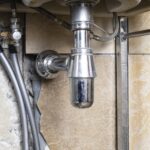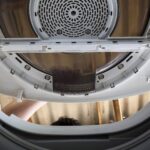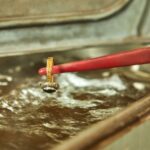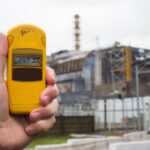Your electric water heater shouldn’t be making unexpected sounds, yet many homeowners encounter strange popping noises coming from their units. This unsettling sound often signals that something is amiss, specifically pointing towards the buildup of scale within the appliance. Understanding the importance of addressing such issues is not just about comfort; it’s key to ensuring your heater operates efficiently and lasts longer.
- Discover why your electric water heater is producing popping sounds, with a focus on mineral deposit buildup as the main culprit.
- Learn the scientific process of mineral scale formation and why it leads to the distinctive popping noise inside water heaters.
- Explore practical solutions for addressing mineral scale buildup, including effective maintenance tips and cleaning techniques.
- Find out how to prevent scale formation in the future, ensuring a quieter and more efficient water heater operation.
By diving into the core reasons behind these all-too-common issues and exploring practical solutions, you’ll not only tackle the symptoms but also prevent future disturbances. Equip yourself with the right tools and knowledge to ensure your electric water heater remains a silent, reliable component of your home system.
Understanding Why Is My Electric Water Heater Making Popping Sounds? Scale Solutions
Electric water heaters are a vital component in many homes, ensuring a steady supply of hot water for various needs. However, a common concern that many homeowners face is the mysterious popping sounds emanating from their units. Understanding why your electric water heater is making popping sounds is crucial to maintaining its efficiency and longevity.
The primary culprit of these curious sounds is the buildup of mineral deposits, commonly referred to as scale. This scale formation is a result of hard water, which is rich in minerals such as calcium and magnesium. As water is heated, these minerals precipitate and settle at the bottom of the tank, creating a layer over time.
As the heating elements of the water heater function, they cause the water trapped beneath the scale layer to heat rapidly. This trapped water turns into steam and attempts to escape, causing the popping or rumbling noises. Recognizing that mineral deposits are the key reason behind these sounds is the first step toward implementing effective scale solutions.
The Science Behind Mineral Scale and Its Noise
The formation of mineral scale in your electric water heater is a result of a fascinating chemical process. When hard water enters the water heater, it carries dissolved minerals like calcium carbonate. As the water heats up, its ability to hold these minerals decreases, leading them to settle out of the water onto the surfaces inside the tank.
This precipitated mineral forms a solid layer known as scale, which can adhere to the inner tank walls and heating elements. Over time, this scale acts as a barrier, affecting the efficiency of the heating process. The unique popping sound you hear is caused by water getting trapped under the scale. Due to localized heating, this water turns into steam, expanding rapidly and resulting in the distinct noise.
This understanding of the mineral scale and the reason behind its noise is essential for homeowners looking to maintain their water heaters. Regularly addressing scale accumulation is key to ensuring that your electric water heater operates smoothly and quietly.
Effective Ways to Address Why Is My Electric Water Heater Making Popping Sounds? Scale Solutions
When your electric water heater begins to make popping sounds, it can often be traced back to mineral scale buildup within the tank. Understanding how to effectively manage this issue is key to maintaining appliance efficiency and extending its lifespan.
One practical method to tackle mineral scale is through regular flushing. This involves draining the water heater periodically to remove accumulated sediment. Start by turning off the power supply and water inlet, then connect a hose to the drain valve to expel the water and deposits.
Another effective approach is using a descaling solution. These solutions are specially formulated to break down mineral deposits without damaging the internal components of your heater. Always follow the manufacturer’s instructions when applying these chemicals.
In addition, installing a water softener can drastically reduce scale formation by removing excess minerals before they enter the water heater. This preventative measure not only minimizes popping noises but also enhances the overall efficiency of your entire plumbing system.
Preventative Measures: Keep Your Water Heater Silent
Preventing scale formation is essential to keep your water heater operating quietly and efficiently. One important strategy is monitoring the hardness of your water, as hard water is the main culprit for mineral deposits. Consider using a water test kit to check mineral levels regularly.
Ensuring your water heater’s thermostat is set to an appropriate temperature can also help minimize scale buildup. High temperatures accelerate mineral accumulation, so maintaining a moderate level can significantly reduce this risk.
Furthermore, scheduling professional maintenance annually ensures that your water heater remains in optimum condition. Technicians can detect early signs of scale formation and perform necessary cleanings or adjustments to prevent future issues.
Finally, educate your household members on the importance of these preventative steps. By collectively taking action, you can ensure a longer-lasting, quieter water heating system.
Products and Tools for Resolving Why Is My Electric Water Heater Making Popping Sounds? Scale Solutions
Addressing the popping sounds in your electric water heater isn’t just about diagnosis—it’s about selecting the right products and tools to effectively tackle scale buildup. Ensuring your water heater operates smoothly and quietly means investing in high-quality solutions specifically designed for scale removal.
Descaling Agents: One of the most popular choices for removing mineral deposits in water heaters is a descaling agent. These chemical solutions are formulated to dissolve calcium and other minerals effectively. When used regularly, they can substantially reduce the severity of popping sounds caused by scale.
Water Heater Flushing Kits: These kits typically include a hose and instructions on how to flush out sediment and scale from your tank. Flushing is an essential part of maintaining your electric water heater, as it helps remove the accumulated deposits and ensures a quieter operation.
Anode Rods: An often overlooked component, anode rods play a critical role in preventing corrosion and scale buildup. Regular replacement of anode rods can extend the life of your water heater and help minimize noises.
Water Softener Systems: Installing a water softener can significantly reduce the amount of calcium and magnesium entering your heater. Softened water prevents the formation of hard scale, thereby mitigating popping noises over time.
Incorporating these tools and products into your regular maintenance routine is vital for maintaining the energy efficiency and longevity of your electric water heater. Check product reviews and seek professional advice to ensure you’re choosing the best options tailored to your specific setup and local water conditions.
FAQ: Addressing Popping Sounds in Electric Water Heaters
What causes popping sounds in electric water heaters?
Popping sounds are often caused by mineral scale buildup inside the heater.
Why does scale buildup make noise?
Mineral deposits trap steam bubbles, which escape and create a popping sound.
How can I remove scale from my water heater?
You can remove scale by flushing the tank or using a descaling solution.
What are preventive measures against scale buildup?
Regular maintenance and using water softeners can help prevent scale.
Which products are recommended for scale removal?
Consider using commercial descaling solutions available at home improvement stores.
How often should I maintain my electric water heater?
It’s advisable to perform maintenance at least once a year.
Is a popping sound dangerous?
While not usually dangerous, it indicates inefficiency and can lead to damage if ignored.





